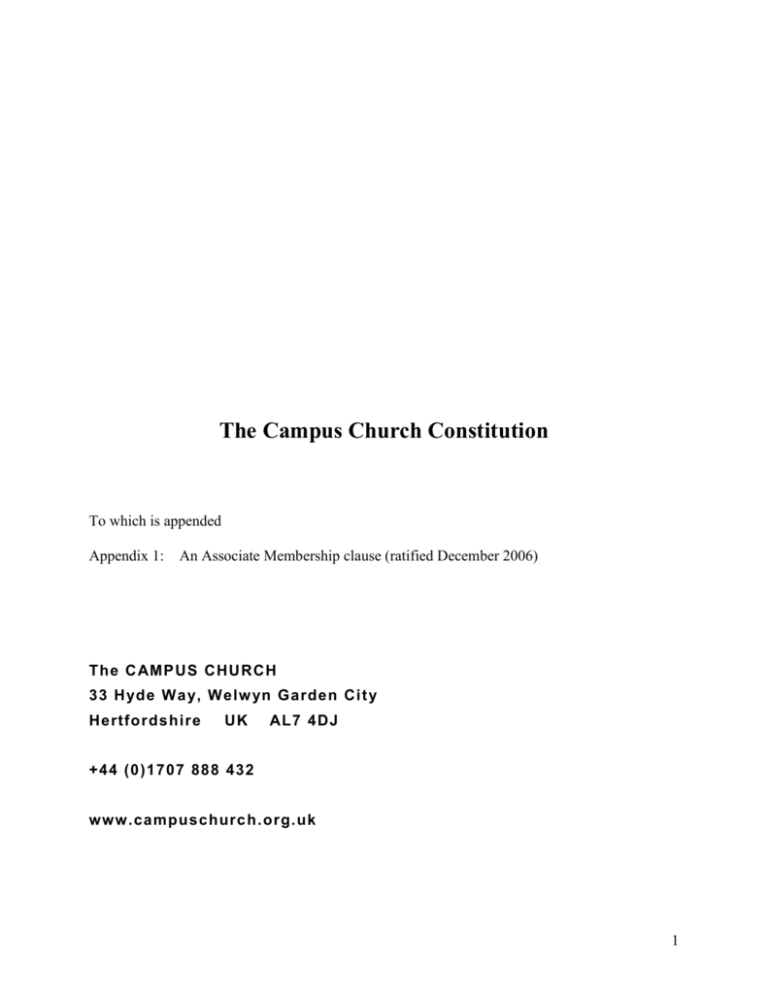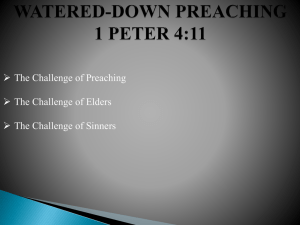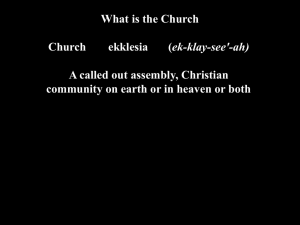The Campus Church Draft Constitution
advertisement

The Campus Church Constitution To which is appended Appendix 1: An Associate Membership clause (ratified December 2006) The C AMP US CHURCH 33 Hyde Wa y, Welw yn Garden Ci t y Hertfordshire UK AL7 4 DJ +44 (0)1707 888 432 www .campuschurc h.org.uk 1 The Campus Church Constitution Introduction The Campus Church is an independent Baptist Church based on the teachings of Scripture alone. While no Confession of Faith can adequately summarise the teaching of Scripture, the Church nevertheless subscribes to the teachings summarised in the historic Baptist Confessions of Faith, in particular that which is common to the 1644 and 1689 Baptist Confessions of Faith. We realise, and history has shown, that holding to any Confession of Faith, however faithful to the Scriptures, is no barrier to apostasy. We are therefore convinced that the best way to guard the Church from error is to guard the pulpit. For this reason only those who take a clear stand on the gospel of salvation through the sovereign grace of God in Christ alone, as outlined in what is commonly called "the Five Points of Calvinism", will be permitted to preach in the Church. The ministry in the Campus Church will be Christcentred and God-honouring. The purpose for which the Campus Church exists is to worship God in spirit and truth (John 4:23); to edify the body of believers (Eph.4:16); and the fulfillment of the Great Commission to take the gospel to all nations (Matt.28:19). The Head of the Church is Christ and the worship, preaching and ministry of the Church is centred on Christ. The church is the body of which Christ is the Head (Eph.4:15; 5:23); the bride of which Christ is the Bridegroom (Rev.21:2); the building of which Christ is the Chief Cornerstone (Eph.2:19-22; 1 Pet.2:6-7). The final authority for all things concerned with doctrine and practice are the Scriptures of the Old and New Testaments alone. This being so, the Church should constantly examine the Word of God and submit to its teaching in all things. Church Government 1. Christ's government is exercised in particular local churches through duly appointed officers, namely elders and deacons, who teach and apply the Word of God. 2. All the recognised elders and deacons in the Church shall be men. We recognise that both men and women are equal before God, but they have different roles in the Church. In this respect the Church reflects the lordship of Christ (1 Cor.11:3). The role of women is important (Rom.16:1), but it is not that of teaching and authority over men (1 Tim.2:12; 1 Cor. 14:34). Women may be involved in teaching children and other women, but not in leading general public worship. 3. We welcome and desire to have fellowship and, where possible, co-operation with other like-minded churches, but at the same time we reject the right of any external body to govern or control the affairs of the Church. Accordingly, the Church shall not enter into any association, union or denomination which could involve the loss of its independence or the right under Christ to self-government. 4. In view of the nature of their office, all elders and deacons must subscribe, without reservation, to the doctrinal basis and constitution of the Church as described 2 herein. In particular they must hold to the following clearly taught doctrines of Scripture: a. b. c. d. Salvation is a sovereign work of God for and in His elect whom He chose in Christ before the foundation of the world (Eph. 1:4). It was for these elect that Christ died in particular, perfectly accomplishing the work of salvation on their behalf, thus meeting all the requirements of a just and holy God (Isa.53:8, 11; Matt. 1:21) It is to the elect that the Holy Spirit applies the work of Christ, bringing them to repentance and faith in Christ. This gospel should be preached to all, without discrimination, calling upon all sinners to repent of their sin and turn in saving faith to Christ alone for salvation. Elders The Scriptures use various terms to designate this office, such as bishops (overseers) pastors, teachers. The terms are used interchangeably in the New Testament and refer to the same office. 1. Number and qualifications. Whilst plurality of elders is desirable, only men with the necessary qualifications are eligible for this office. These are laid down in 1 Tim.3:1 7 and Titus 1:5-9. 2. Function. The task of the elders is to oversee, rule and teach the Church. They are responsible for conducting public worship, the preaching and teaching ministry, the administration of the Lord's Supper and Baptism, the preservation of purity of doctrine and the maintenance of discipline. All meetings and organisation of the Church come under their supervision. They are responsible for the appointment of leaders in all the realms of church life. The regular ministry of the Word of God is committed to the elders. With the consent of the Church one of their number may be appointed as full-time pastor or they may invite a suitably qualified elder from another church to join them in this role. 3. Appointment. The right of nomination and recommendation to the eld ership belongs to the existing elders. Nominees must be approved by 75% of the total church membership. Ordination to the office should take place at a meeting of the Church and be conducted by the existing elders 4. Resignation or dismissal. (1) In the event of any serious accusation being brought against an elder, the procedure laid down in 1 Tim.5:19 is to be strictly adhered to. (2) If an elder should prove not to be fitted for his office, or be unable for any other reason to fulfil his office, it is the responsibility of the other elders and the Church to recognise this and he should be asked by the other elders to resign or else be relieved of his office. Deacons 1. Number and qualifications. As with elders, a plurality of deacons is desirable, but only men with the necessary spiritual qualifications are eligible for this office. These 3 are laid down in 1 Tim.3:8-13. 2. Function. The task of the deacons in general is to relieve the elders from being burdened by the material affairs of the Church. They will work closely with the elders and all decisions will be made in conjunction with the elders. Final authority on all church life, including material matters, rests with the eldership who would normally delegate matters concerned with the material affairs of the Church to the deacons. Deacons, as spiritually mature men, may also be called upon by the elders to preach. 3. Appointment. The right of nomination and recommendation to the diaconate belongs to the elders. Nominees must be approved by 75 % of the total church mem bership. Ordination to the office should take place at a meeting of the Church and be conducted by the elders. 4. Resignation or dismissal. If a deacon should prove not to be fitted for his office, or be unable for any other reason to fulfil his office, it is the responsibility of the elders and the Church to recognise this and he should be asked by the elders to resign or else be relieved of his office. Church Membership . Its necessity. For the Christian, belonging to a local church is a necessity. The New Testament assumes that all baptised believers will be added to the Church (Acts 2:4142). These are local churches and many of the Epistles in the New Testament are addressed to local churches. They are important in God's eyes and every true believer should therefore be a member of a local church. 2. Admission to membership. According to the New Testament teaching admission to church membership is through baptism. Church membership is open to all who have exercised repentance towards God and faith in Christ alone for salvation, who have been baptised as believers, and who accept the Constitution of the Church. The elders shall inform the Church of new applications for membership and any member who has grounds for considering an applicant unsuitable for membership should make this known to the elders. A register of members shall be kept. Membership shall cease if a person does not participate regularly in the life of the Church. 3. Responsibilities. a. True believers will seek the fellowship of other believers and to this end they will desire to meet for corporate worship as often as possible. Church members will therefore be expected to meet regularly with the Church for worship. Those who do not do so and who are unable to give a valid reason for their absence to the elders may, at the elders' discretion, be removed from church membership. b. To make every effort to maintain "the unity of the Spirit in the bond of peace" (Eph.4:16) and to avoid creating divisions (Ps. 133: 1). c. To give regular financial support to the Church as the Lord enables them, in obedience to the Scriptural principles (1 Cor. 16:2). d. To recognise and submit to the spiritual authority of the Church elders, insomuch as 4 this authority derives from the Word of God (Acts 17:11). e. To bear a consistent witness and testimony to the world. f. To minister to the temporal needs of all, as the need arises, and in proportion to their ability. g. To show concern for, and to make every effort to promote, the spread of the gospel of sovereign grace throughout the world according to their gifts, abilities and means. 4. Privileges. a. Members are entitled to partake of the Lord's Supper as often as it is administered. b. Members are under the pastoral care of the elders, to whom they have direct access for consultation and prayer whenever it is mutually convenient. c. At the discretion of the elders, church members will be consulted on matters relating to the life of the Church. In particular they have the right to express their opinion in the matter of the appointment of church officers. Church Discipline In the New Testament discipline takes one of two forms; admonition or withdrawal of fellowship. Any discipline exercised should be remedial and not punitive and should be carried out in a spirit of concern and love and for the glory of Christ alone (Gal 6:1; 2 Tim. 2:24-25). In general, discipline may be necessary where a clear, deliberate and persistent breach of the responsibilities of membership has occurred. In particular, the New Testament indicates four main categories of offence requiring church discipline: a. Holding and propagating beliefs contrary to the plain teaching of Scripture and destructive of the gospel, or denying any truth fundamental to the gospel such as those summarised in the Church's Confessions of Faith (2 John 9-11). b. Creating a faction or division in the Church through party spirit or causing strife (Eph.4:2-2; John 7:20-23; Rom. 16:17). c. A deliberate offence committed against a fellow Christian which is not followed by an apology and restitution (Matt.5:23-24). d. Persistent behaviour unworthy of a Christian. Procedures a b c Charges against a member shall be submitted to the elders, who will investigate the matter. The primary objective of the elders in dealing with matters of discipline shall be to bring the offender to repentance before God and into true fellowship with the church (Gal6:1 Offenders who refuse to listen to the elders and who persist in their offending conduct 5 d or beliefs may, as a first step, be required to refrain from participation at the Lord’s Supper. Persistent refusal to listen to the elders may, at the elders’ discretion lead to the offender being excluded from church membership. In this case the church membership shall be informed of the elders’ action. Church Ordinances 1. Baptism. a. Baptism is by immersion in water and is to be administered to those who profess faith in Christ as Saviour and Lord, and give evidence of regeneration. b. Since the New Testament indicates that baptism was the rite by which believers became members of the local church (Acts 2:41), those who are baptised in the Campus Church will normally be expected to become members of die Church. 2. The Lord's Supper. a. The Lord's Supper shall be administered as frequently as the elders deem desirable. b. It is the Lord's Supper and we meet around the Lord's Table. We therefore welcome to the Lord's Table all who are true believers and who have been baptised on confession of their faith in Christ. c. Believers from other churches, who are worshipping with us on a temporary basis because good and legitimate reasons prevent them from attending their own church, may be welcome to the Lord's Table. They should consult with the elders before participating of the Lord's Supper. Meetings of Church Members The church of Christ is a "theocracy", and not a "democracy". Christ is the Head of the Church (Col. 1:18; 2:19). In all things it should be governed and ruled by those whom He has appointed and entrusted with responsibilities in His church, the elders and deacons. However, from time to time the elders may deem it wise to consult the Church on certain practical matters relating to the life of the Church. a. An Annual General Meeting will be held at which the Church will be informed of the financial position of the Church and any other relevant matters. b. Church meetings may also be called by the elders for purposes such as: (1) Reporting on the spiritual condition and life of the Church. (2) Seeking the mind of the Church on the appointment of church officers. (3) Projects involving large capital expenditure. (4) Alterations to the Church constitution. c. Church meetings will be announced at the Church services on two Sundays preceding the date of the meeting. d. An authorised church meeting for the transaction of business shall consist of at least 6 50% of the total church membership who are geographically and physically able to be present at the meeting. e. Only members over 18 years old may vote at church meetings. f. Normally the elders should seek a consensus of church members at meetings, but where they decide to call for a vote the agreement of 75 % of those present will be required for any motions to be carried. g. Ballots will normally be open, but secret ballots may be held, at the discretion of the elders. h. The elders shall have full authority to exercise discretion over which matters will be placed on the agenda for church meetings. 7 Appendix 1 – Associate Membership The Campus Church is a Baptist assembly; we believe our distinctive position on the subject of baptism and church government to be the plain teaching of the New Testament. In upholding these doctrines Christ is honored, and for them at times our brethren have suffered persecution. These precious teachings are helpfully summarized in the London Baptist Confessions of 1646 and 1689. Constitutionally therefore, only those who hold to such teaching may enter the formal, covenanting membership of this assembly. Yet we recognize that other protestant, evangelical and true believers in the Lord Jesus Christ, who differ in their view of baptism and church government, are spiritual members of His body. Thus constrained by the love of Christ, in a day when biblical churches are relatively few, we desire to embrace all whom Christ has received and to encourage them in their gospel walk. We recognize our spiritual unity with those who, though differing in ecclesiastical polity, are members of this local church: worshipping faithfully and professing Christ consistently in our midst. To this end we make provision for associate membership of the Campus Church for those who have a credible profession of Christ but are not Baptist and therefore cannot become formal members. The privileges and responsibilities of formal membership, as outlined in our church’s constitution, will be theirs; save that they will not be permitted to hold office or have the right to vote in the business meetings or ballots of the Campus Church but have every liberty to attend such occasions. Associate membership may also be extended to believers who for a limited but significant period are resident in the local area but whose permanent home is elsewhere. Application for associate membership is to be received by the Elders and will be under their governance. A list of all associate members will be kept, in the same manner as the formal membership. 8






